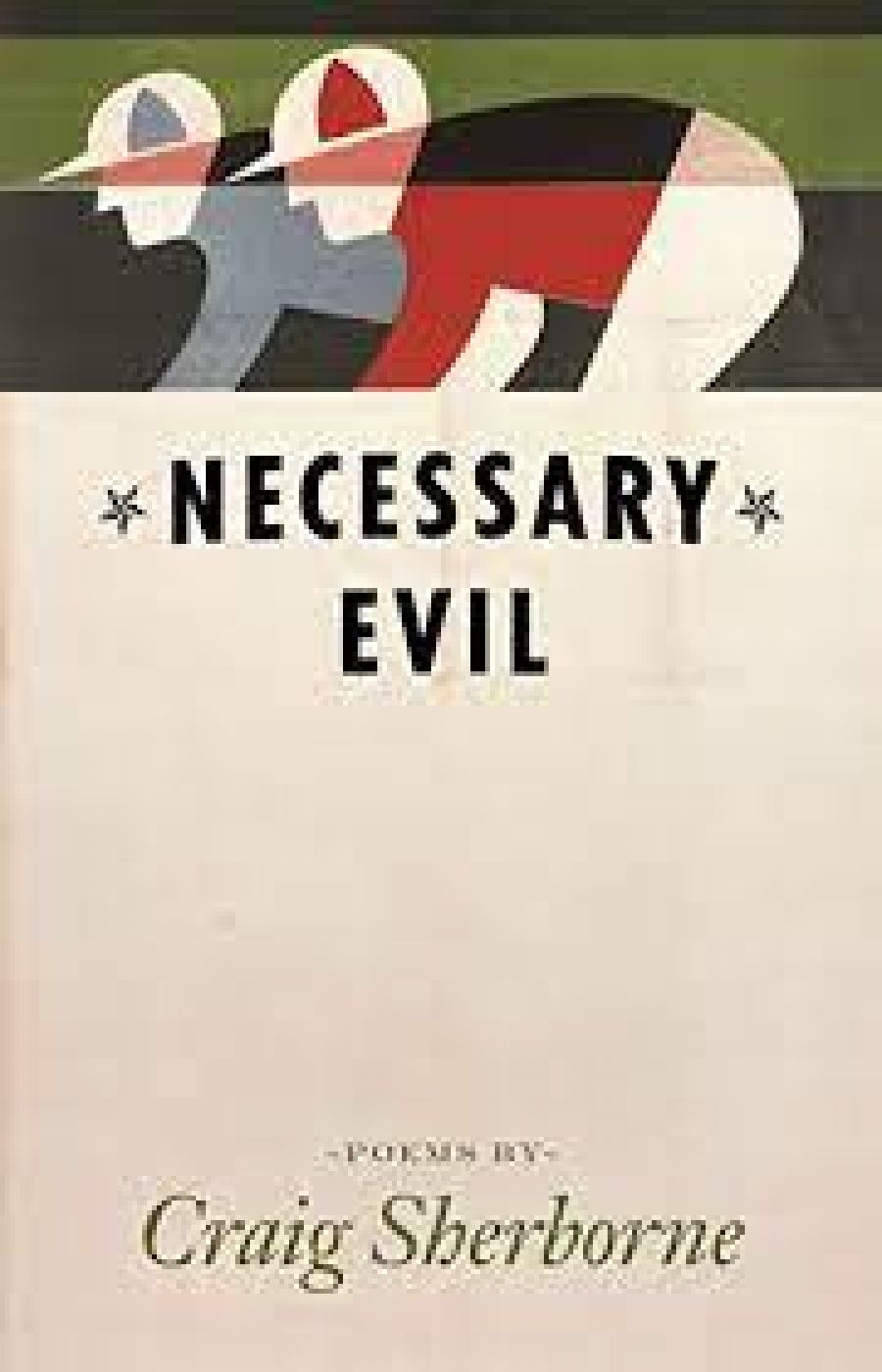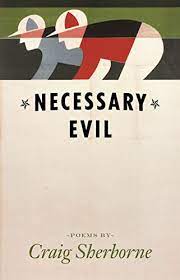
- Free Article: No
- Contents Category: Poetry
- Review Article: Yes
- Article Title: Reckoning with hard truths
- Online Only: No
- Custom Highlight Text:
Craig sherborne is a poet, playwright and journalist. I remember being struck by the poetic quality of a delightful passage in his memoir, Hoi Polloi (2005), where he sketches a child’s view of flirtatious men chatting up younger women at the races: ‘The Members Bar. Race Five. Time of the day when men take women by the waist.’ Peter Craven commends that book as ‘scurrilous and unashamed’ and ‘a comic outrage’. Sherborne brings the same sharp eye, but a somewhat subdued humour, to his new volume of poetry, Necessary Evil.
- Book 1 Title: Necessary Evil
- Book 1 Biblio: Black Inc., $24.95 pb, 73 pp
- Book 1 Cover Small (400 x 600):

- Book 1 Cover (800 x 1200):

In this, his second collection, there is initially more of that feeling of a not-so-innocent child critically assessing his elders, with faint disappointment but abiding curiosity. Sherborne opens the door on mainly domestic spaces: the lounge room, laundry and bedroom. This is where the frankly observed intimacies of families and couples are shown in all their awkward beauty. Sherborne likens the process of writing a poem to putting things into a jar (‘The Poets’), and these poems are little containers of moments drawn out of affection or sourness or simple puzzlement. The idiosyncrasies of ageing parents and their racing acquaintances, for instance, or a tentative and somewhat unsavoury seduction by a friend’s mother – such things are sketched with precision. If the poems are jars, some of the lines are little jewel boxes: ‘My mum conducted smoke with her cigarette.’
We might expect that Sherborne’s insights into horse racing would show verisimilitude, grounded as they are in his personal experience as a child in a racing family. In ‘A Racing Life’, he riddles:
My uncles and I weren’t related.
They had something they did in Chinatown.
They poked a washboard of maths
on their betting-stands, and wore
a white side-drummer’s bag.
These scenes do ring true, both in their characterisation and in the description of events. Perhaps showering a bed with winnings is a ritual exercise; former in-laws of mine did the same thing when their own horses won, though I doubt they threw money while using the bed for a trampoline, as the narrator’s exuberant father does in this poem.
The collection is mainstream poetry, generally anchored in fairly safe subject matter and style, while showing flashes of brilliance and a willingness to take some risks with language. Sherborne has a particular strength in the use of intriguing openings, such as ‘My mother slept in toilet paper’, and ‘I help my mother into her bosom’. He sometimes lets a poem’s ending trail into ellipsis or settles for an obvious statement, which tends to undercut its force. This is a matter of fine judgment at times; while I hoped for a more effective closing in some cases, the poems in question are still neat parcels of observation. Sherborne’s play with metaphor (the mother’s ‘purses with crossed fingers’) is particularly appealing. His feel for a tight image is rewarding, as when he describes an unfaithful man waiting for his partner to wake and leave: ‘I keep still / until she shadow dresses on the wall.’
Sherborne plays with titles, too, using the same one three times (‘Journo’) and another twice (‘Piss Talk’). The earlier batch presents a world-weary insider’s perspective on the seemingly tawdry business of making the news. This might be seen as easy territory for Sherborne – he is a senior writer with Melbourne’s Herald Sun – but it would be wrong to take for granted his economy of phrase and aptness of description. The first of these poems is a scintillating and slightly disturbing exercise in self-identification: ‘My desk’s across from Racing / I’m Murders-Paedophiles-Falls from Grace.’ There is an echo here of a Geoff Page poem on a newspaper obituarist.
Poems in the middle of the book orbit issues of relationships – breaking up, flirting, new love – sometimes examining the smallest details with a cool and troubling narration. Sherborne productively engages a rather detached voice that augurs badly for one new love, allowing a shadow to fall over the future of the relationship. In ‘Collett’s Store’, for instance, he presents extravagant promises and claims of devotion, only to deftly turn the mood into something al-together chilling in the last two lines.
In the final poems, Sherborne focuses on life in the country and especially the effects of drought, which he uses effectively to display a feeling for place. Sometimes that moves beyond the literal, such as in ‘Harvest Ritual of the Seven Houses’, which builds a lyrical momentum about a small town where dusk is ‘the morning of the night’. He conveys emotional states with a light and sure touch, creating a strong sense of individual characters and the distances between them. There is an acutely realised sense of their reserved nature, and the reticence of their interaction builds a tension that awaits discharge beyond the moment of the poems.
The title of the book underscores the whole collection, not merely for an association with gambling and the initial poems that deal with horse racing. There is also a sense of reckoning with hard truths and, while there is little joy in the world depicted, there is very satisfying poetry. It has been eleven years since Craig Sherborne’s last poetry collection: I hope that the wait for his third is not as long.


Comments powered by CComment